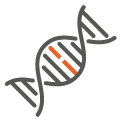Research
Our research is focused on the study of cancer from a genomics perspective. We are particularly interested in the identification of cancer driver mutations, genes and pathways across tumour types and in the study of the mutational processes across tissues and genomic regions.
Finding drivers of cancer
Cancer is mainly a genetic disease. It is caused by genomic alterations that confer somatic cells competitive advantages over neighboring cells in the same tissue. The mutations affected by these alterations are commonly referred to as cancer drivers because they drive the abnormal growth of malignant cells.
Given the evolutionary principles of cancer, one effective way to identify cancer genes is by tracing the signals left by the positive selection of driver mutations across tumours. Using this concept we analyze thousands of tumor genomes to generate a compendium of cancer genes across tumor types (http://www.intogen.org), and we build machine learning models inspired in evolutionary biology that effectively identify driver mutations in each gene and cancer type (http://www.intogen.org/boostdm).








